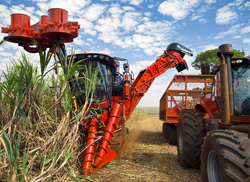
Over the years, sugar output has remained below local demand forcing the country to import sugar to fill the gap despite investments in sector.
Sugar is the second-largest contributor to Kenya’s agricultural growth after tea. There are three sugar-belts in Kenya; Nyando, the western sugar belt and the south Nyanza sugar zone. Approximately five million people depend on sugar cane farming in Kenya either directly or indirectly. 88 percent of the total area under sugar cane in Kenya is undertaken by out growers. The majority of these are small-scale growers, whilst the remaining area is largely under sugar factories in the form of nucleus estates.
The area under cane is 123,622 hectares of which 111,189 ha is farmed by smallholders and 12,433 under nucleus estates. Kenya’s annual production ranges from 400,000 – 500,000 metric tons. Sugarcane is an important cash crop in Kenya, supporting over 200,000 farmers. In addition, an estimated six million Kenyans derive their livelihood directly or indirectly from the sugar industry. Domestic production of sugar saves the country about billions in foreign exchange. The government is the main investor in the sugar industry having spent over Ksh16.7 billion as principal loan for development of the industry over the last 40 years. The government controls shares in five publicly owned sugar mills. Despite massive investments over the years, self-sufficiency in sugar production has remained elusive as consumption continues to outstrip supply. In 2009 for instance, consumption was 605,358 metric tonnes compared to a production of 548,208 metric tonnes. Kenya is a signatory to the Common Market for Eastern and Southern Africa (COMESA), which allows duty and quota free access of commodities including sugar from the Free Trade Area into the Kenyan market and ACP-EU trade arrangement, which offers preferential access of Kenyan commodities in the European market.
Fact-File
- 5 million – Number of Kenyans who depend on sugar cane farming either directly or indirectly.
- 88% – The total area under sugar cane in Kenya undertaken by out growers.
- 491,000 metric tonnes – Total sugar output in Kenya in 2018
- 376,000 metric tonnes- Total sugar output in 2017
- 989,600 metric tonnes – Total imports of sugar in 201
The Government through the privatization commission has taken the lead in implementing a comprehensive financial restructuring programme to prepare the industry for full privatisation. The Kwale International Sugar Company is the latest addition to the sugar producers. The factory will cost approximately Ksh18 billion when fully operational, and employ 3,000 people directly and another 11,500 indirectly.
Sugar Act
The sugar industry is governed by the Sugar Act No. 10 of 2008. It establishes the Kenya Sugar Board that is mandated to regulate the industry and the Sugar Development Fund for research and development of the industry.
In order to ensure that the industry remains competitive and responds to global demands, necessary strategic interventions that include formulation of policy and the review of the legal framework governing the sector have been done. The legal review covers the following areas:-
- Improvement of the sugar board’s surveillance powers to cover sugar imports;
- Introduction of a more representative eligibility criteria for stakeholders’ representation in a leaner Regulatory Board;
- Ensuring good governance in the industry and in particular the administration of the Sugar Development Fund by separating the administration of the fund from the regulator, KSB.
- Improvement of the management of the Sugar Development Fund by introducing a board of trustees and rationalizing the penalties for non-remittance of levies.
- Remove inconsistencies in the Act including provisions that may hinder privatisation.
- Providing for the enforcement of the Sugar Tribunal decisions and appeals.
These changes come at a time when the industry is racing against the clock to increase efficiency and compete with sugar from members of the COMESA trading bloc. It costs Ksh41,800 to produce a tone of sugar in Kenya, while in Sudan, it costs Ksh24,000.
